Eunsol Lee (b. 1988) has been creating artworks based on the ongoing process of constructing, maintaining, and sustaining a virtual character named “Kimberly Lee” within digital networks. Through this process, Lee explores the existential value of digital objects within a digital value system—an intricate web formed by the overlapping economic activities of individual online platforms. At the same time, she researches various platforms and future habitats, planning and executing living environments that ensure Kimberly’s survival within the network.
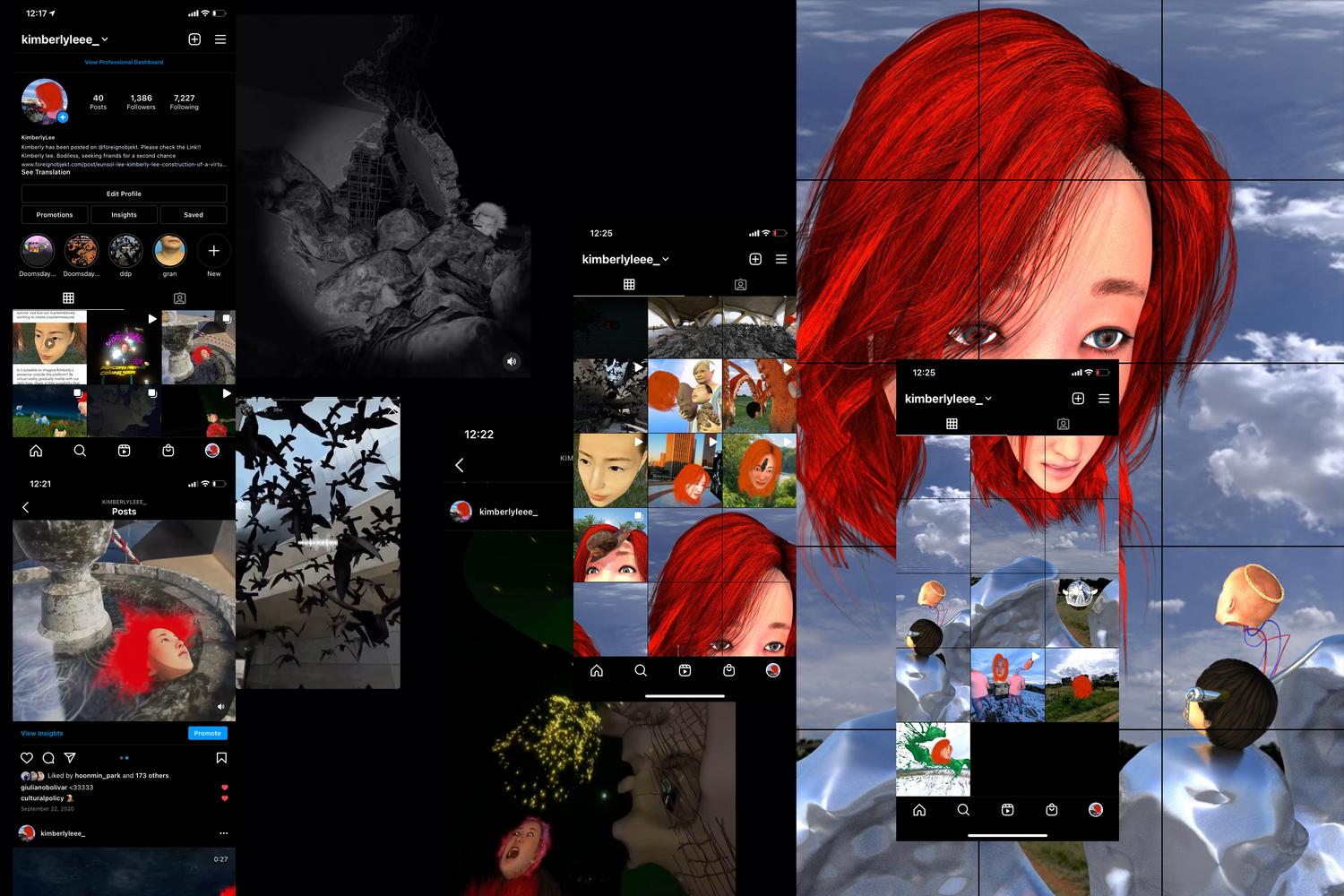 Eunsol Lee,
Happy Easter, 2020-, video (Unity, Maya), Instagram @kimberlyleee_
©Eunsol Lee
Eunsol Lee,
Happy Easter, 2020-, video (Unity, Maya), Instagram @kimberlyleee_
©Eunsol LeeThe name "Kimberly Lee"
originated from an incident in 2017 when someone hacked Eunsol Lee's Instagram
account and changed the account name to Kimberly—a change the artist did not
notice for nearly a year. During that time, without Lee's awareness, Kimberly
had begun to extend and replicate parts of her identity in that digital space.
When Lee eventually regained access, Kimberly had already taken root in the
active online ecosystem.
Rather than erasing Kimberly’s traces or
presence, Lee chose to manage Kimberly’s life—just like other avatar account
administrators. Art critic Hur Hojeong explains, “Eunsol Lee respects the
autonomous system that is an extension of reality as well as keeps certain
distance from it and confronts Kimberly as a figure who lives in a parallel
reality.”
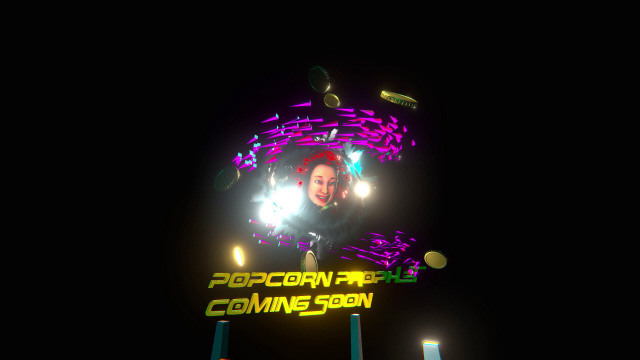
Eunsol Lee, Popcorn Prophet trailer 001, 2020-, Single-channel video, 4min. 42sec. ©Eunsol Lee
This signifies the intervention of a
virtual identity into the artist’s own life. Eunsol Lee has taken on the role
of manager for the virtual entity Kimberly, focusing on the structural
frameworks that sustain such a digital persona.
For example, Lee describes Kimberly as
follows:
“Because Kimberly is herself the very
evidence of the intrusion—of hacking—she carries an aura of danger with her. At
times, minor incidents such as another hack or even a drop in Unity’s stock
price evoke a sense of crisis surrounding Kimberly. These issues are often
rooted in skepticism and anxiety about emerging technological environments.”
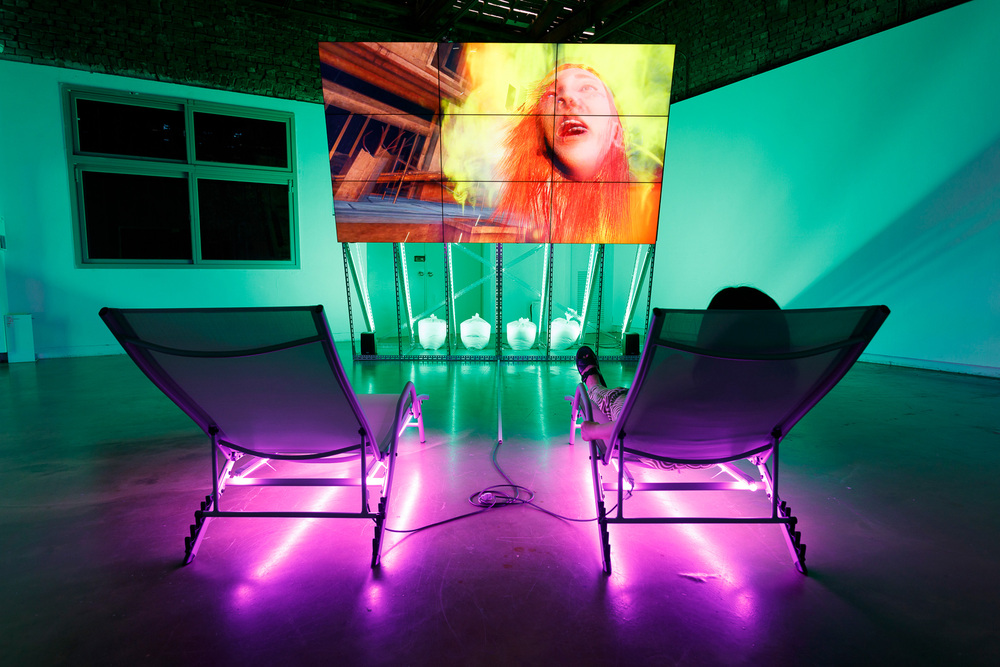 Installation view
of 《KIMBERLY EXTRACT》 (SeMA Storage, 2021)
©Seoul Museum of Art
Installation view
of 《KIMBERLY EXTRACT》 (SeMA Storage, 2021)
©Seoul Museum of ArtThe artist’s interest in reality and
technological environments has been concretized through Kimberly, a character
who exists solely as a head without a body. In her 2021 solo exhibition 《KIMBERLY EXTRACT》 at SeMA Storage, Eunsol
Lee presented a series of works in which Kimberly is placed within various
environments and made to survive within them.
Lee captured and translated into video the
moments of movement, metamorphosis, dismemberment, and synthesis performed by
the digital lifeform Kimberly, who is situated in diverse settings defined by
the artist. In the video work Firefly (2021), the virtual
entity adapts to its surroundings—resting in a bathtub, lying on a bed, or
creating a soft magic circle in an attempt to transform ruins into a new
environment.
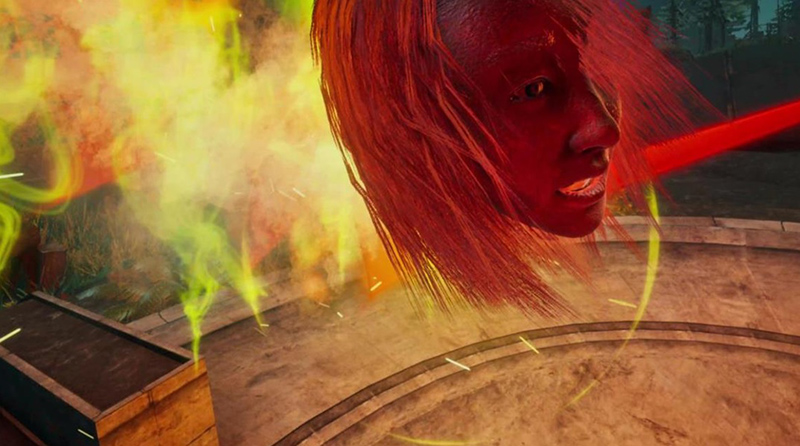 Eunsol Lee,
Firefly, 2021, Single-channel video, color, sound, 8min.
30sec. ©Eunsol Lee
Eunsol Lee,
Firefly, 2021, Single-channel video, color, sound, 8min.
30sec. ©Eunsol LeeVirtual characters like Kimberly, who exist
only as heads, flit about like fireflies—glowing briefly before disappearing.
These works form part of a series of experimental projects in which Kimberly,
as an independent entity, is tested for survival within technological
environments. Through these attempts, the artist traces and documents
Kimberly’s process of shaping a multi-reality existence.
However, Kimberly's autonomy as a complete
subject often ends in failure. The video work I want to be a
cephalopod (2021) metaphorically explores the existence of the
virtual lifeform Kimberly through a dialogue between two disembodied heads. In
their conversation, they refer to traditional soul theories and the body
transplantation experiments of Robert Joseph White, who worked on monkeys, in
order to reflect on the relationship between soul and body.
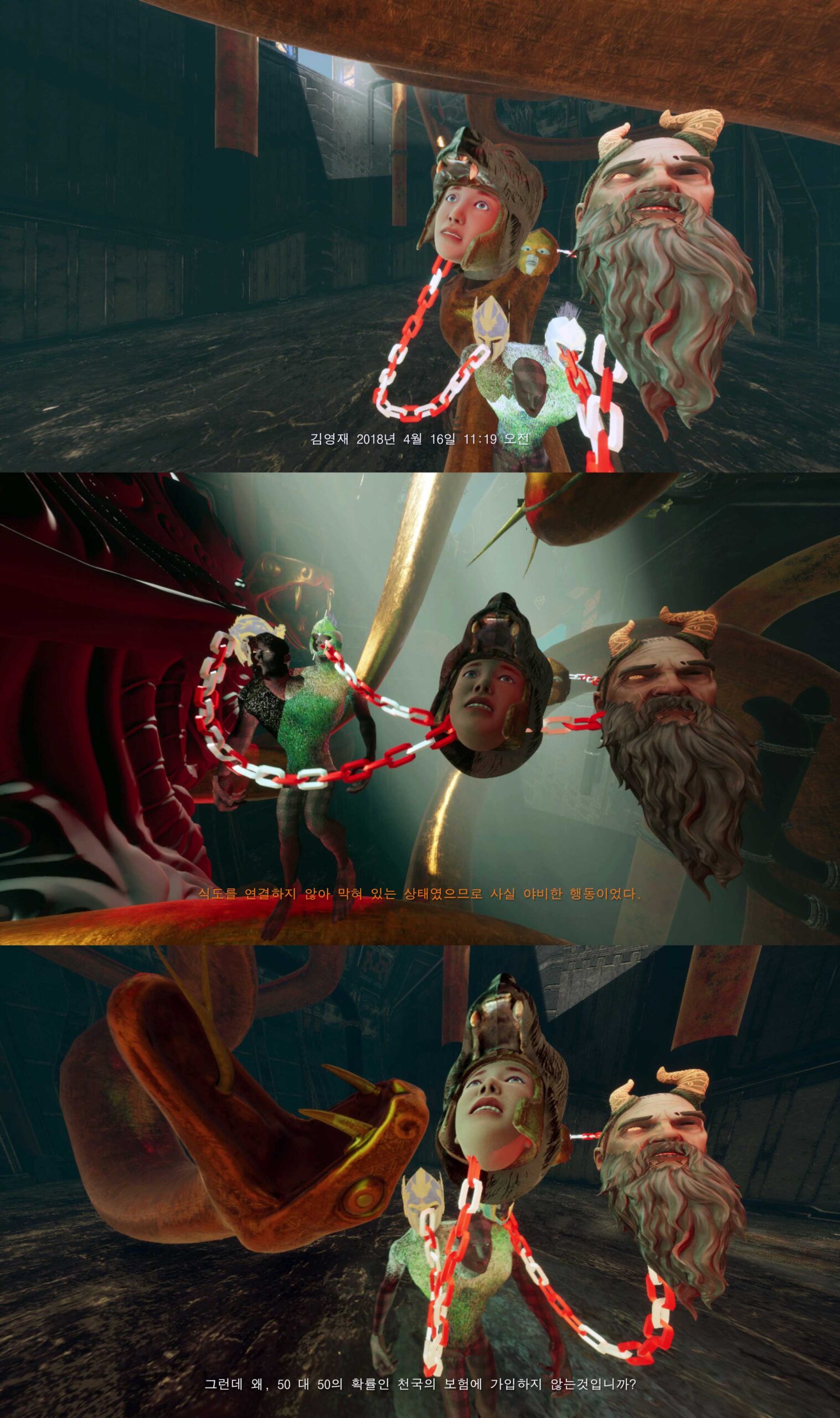 Eunsol Lee,
I want to be a cephalopod, 2021, Single-channel video,
color, sound, sound CLOVA dubbing, 4min. 30sec. ©Eunsol Lee
Eunsol Lee,
I want to be a cephalopod, 2021, Single-channel video,
color, sound, sound CLOVA dubbing, 4min. 30sec. ©Eunsol LeeThe text within the video delves into whether the mind or soul is connected to the entire body or originates solely from the brain (or head). It raises a critical question: if reality is assumed to be the body and virtuality the head, can Kimberly truly exist independently?
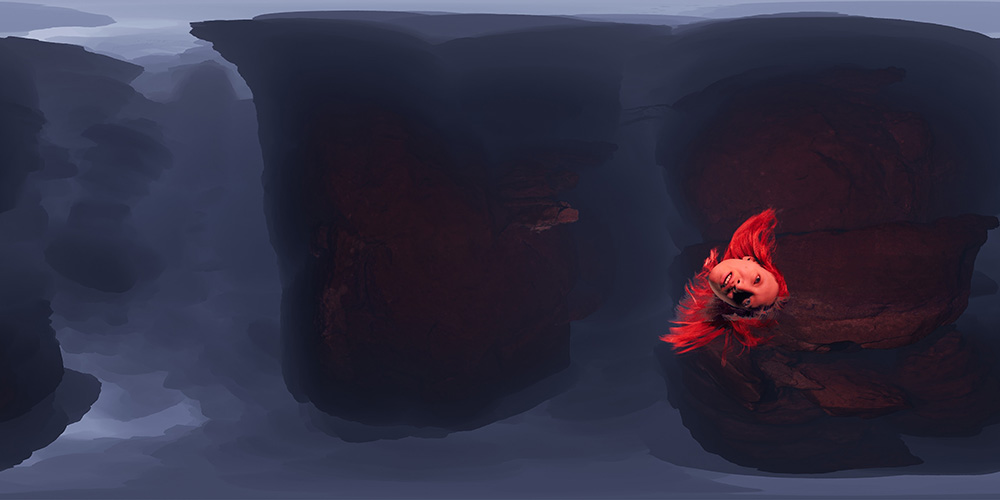
Eunsol Lee, Nanight, 2021, 360 video, 4K, color, sound, 8min. ©Eunsol Lee
Today, as cryptocurrencies like Bitcoin
influence the tangible economy, and virtual spaces like the metaverse treat
virtual and real infrastructures as equivalent, the interrelationship between
the real and the virtual continues to deepen—blurring the boundaries between
the two more than ever.
In this context, Eunsol Lee has continually
experimented with optimizing the virtual entity Kimberly to flexibly adapt and
survive within various virtual environments. According to the artist, this
“optimization” refers to “finding the appropriate degree of value that enables
the most effective performance within a suitable environment.”
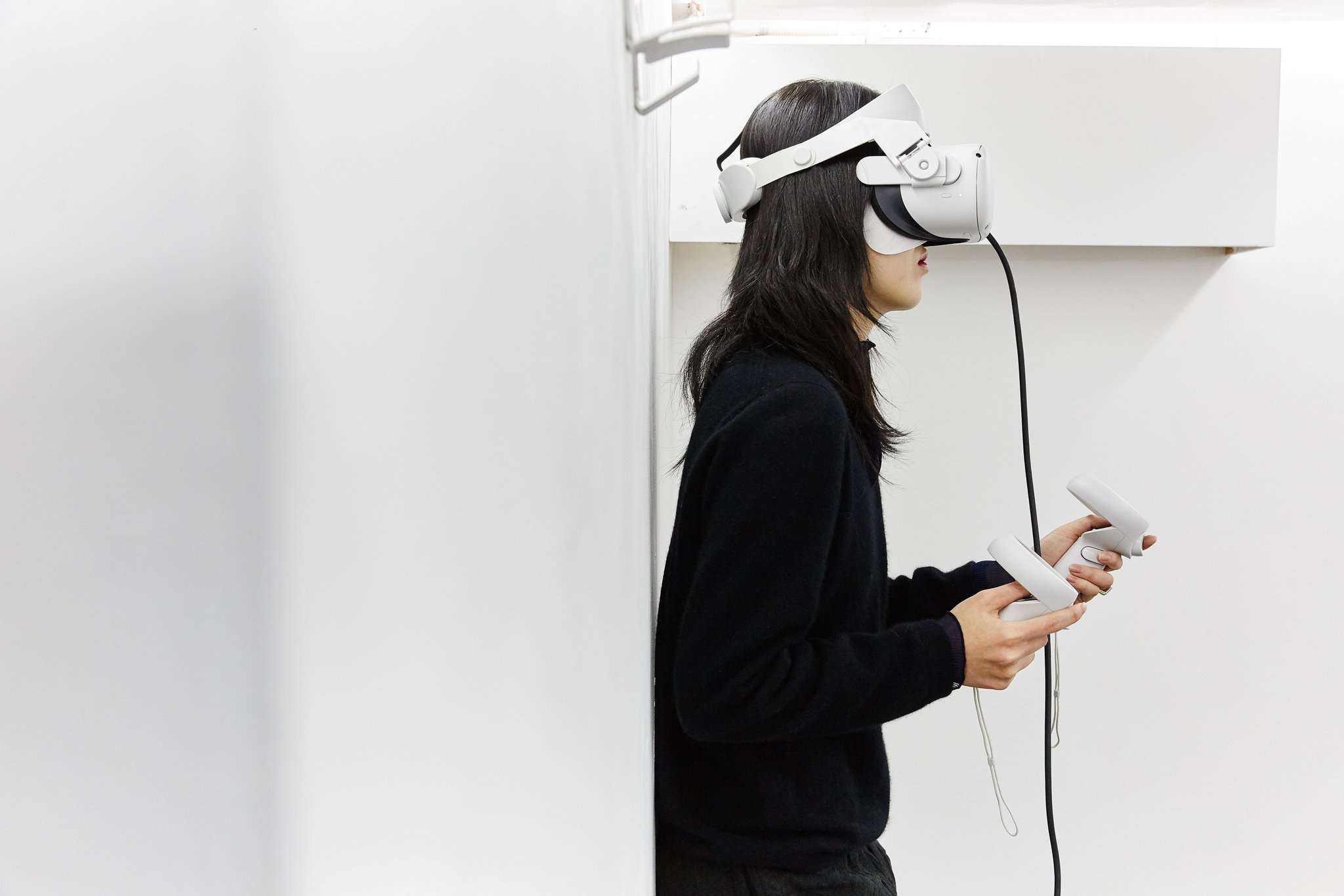 Installation view
of 《Kimberly the Optimist》 (Space 413, 2021) ©Space
413
Installation view
of 《Kimberly the Optimist》 (Space 413, 2021) ©Space
413In Eunsol Lee’s second solo exhibition, 《Kimberly the Optimist》, held at Space 413 in
2021, the artist explored the process of upgrading Kimberly’s optimized state
in response to various given environments, using virtual platforms and game
engines such as VRChat, Instagram, and Unreal Engine 5.
One notable work,
Nanight (2021), is a 360-degree video set within a modified
promotional environment showcasing Unreal Engine’s Nanite technology. Nanite is
a virtualized micropolygon geometry system that enables real-time rendering of
hyper-detailed visuals optimized for a gamer's screen.
Within the video, Kimberly continually
moves through this dramatically optimized environment, a space where
technological precision meets visual intensity. Lee captured these scenes in
360-degree video and transferred them to the Oculus VR headset, allowing
viewers to immerse themselves in Kimberly’s journey toward optimization.
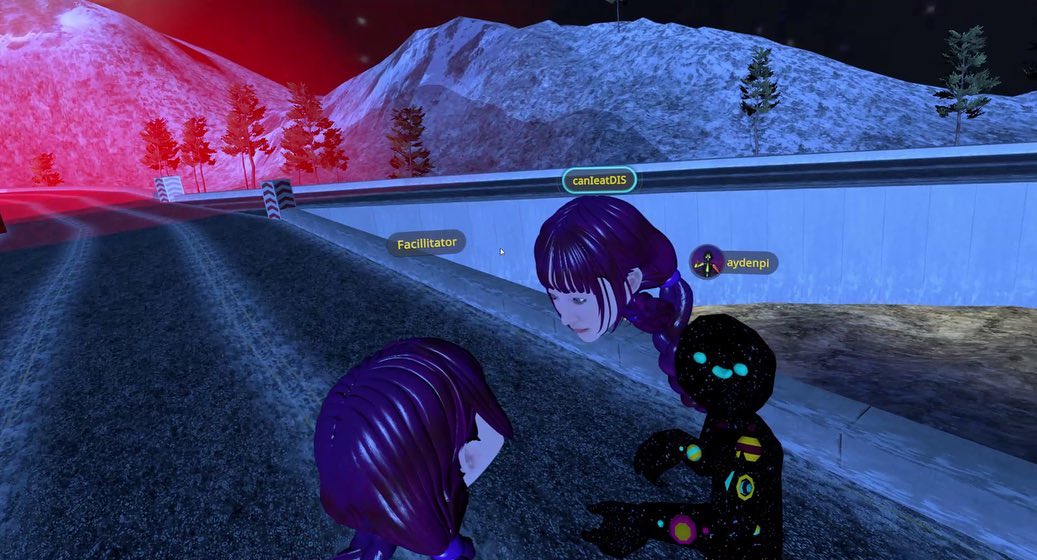 Eunsol Lee,
My Cephalopod Friends, 2021, VRchat Open World Game, avatar,
3d ©Eunsol Lee
Eunsol Lee,
My Cephalopod Friends, 2021, VRchat Open World Game, avatar,
3d ©Eunsol LeeMeanwhile, My Cephalopod Friends (2021) is a work in the open-world game genre, featuring a shallow and roughly constructed environment but utilizing the social virtual world platform VRChat, where diverse interactions between users can take place. In VRChat, the audience navigates the virtual world created by the artist alongside other users, embodied as the braided-hair avatar named Kimberly.
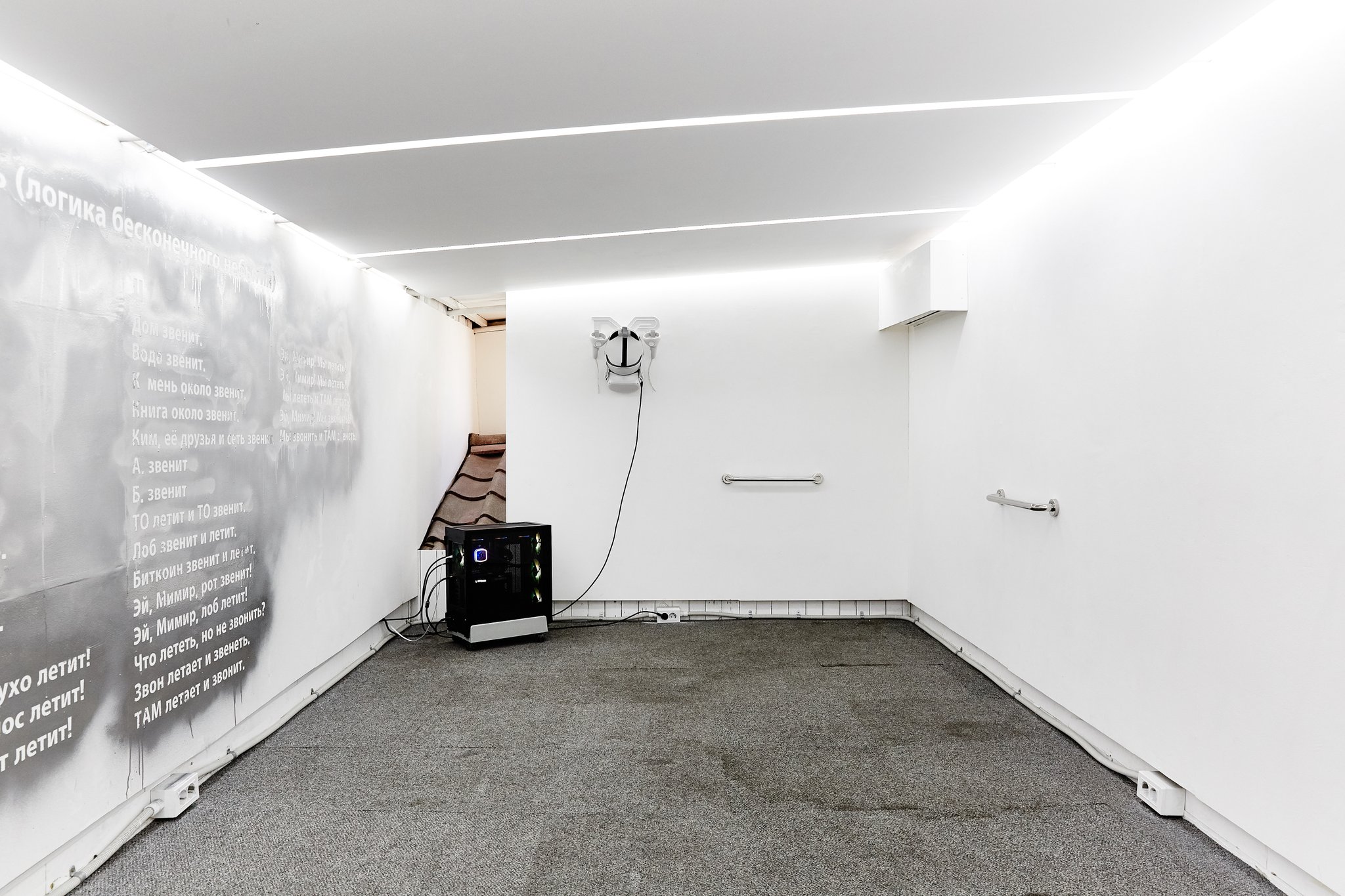 Installation view
of 《Kimberly the Optimist》 (Space 413, 2021) ©Space
413
Installation view
of 《Kimberly the Optimist》 (Space 413, 2021) ©Space
413Kimberly’s infinite movement within the
digital interface leads to a deeper exploration of her existence. The poem Tremble-Fly
(Third Cisfinitum) (1930) by the Russian avant-garde and absurdist
poet Daniil Kharms, which was inscribed on the exhibition wall, serves as a
metaphor for Kimberly’s existence expanding into infinite realms.
Kharms expresses various living creatures,
objects, and even the flow of time in a fluid and nonlinear tense, encouraging
us to imagine infinite realms beyond logical and orderly space-time. Through
this, the artist guides the audience to move toward Kimberly who exists “right
there.”
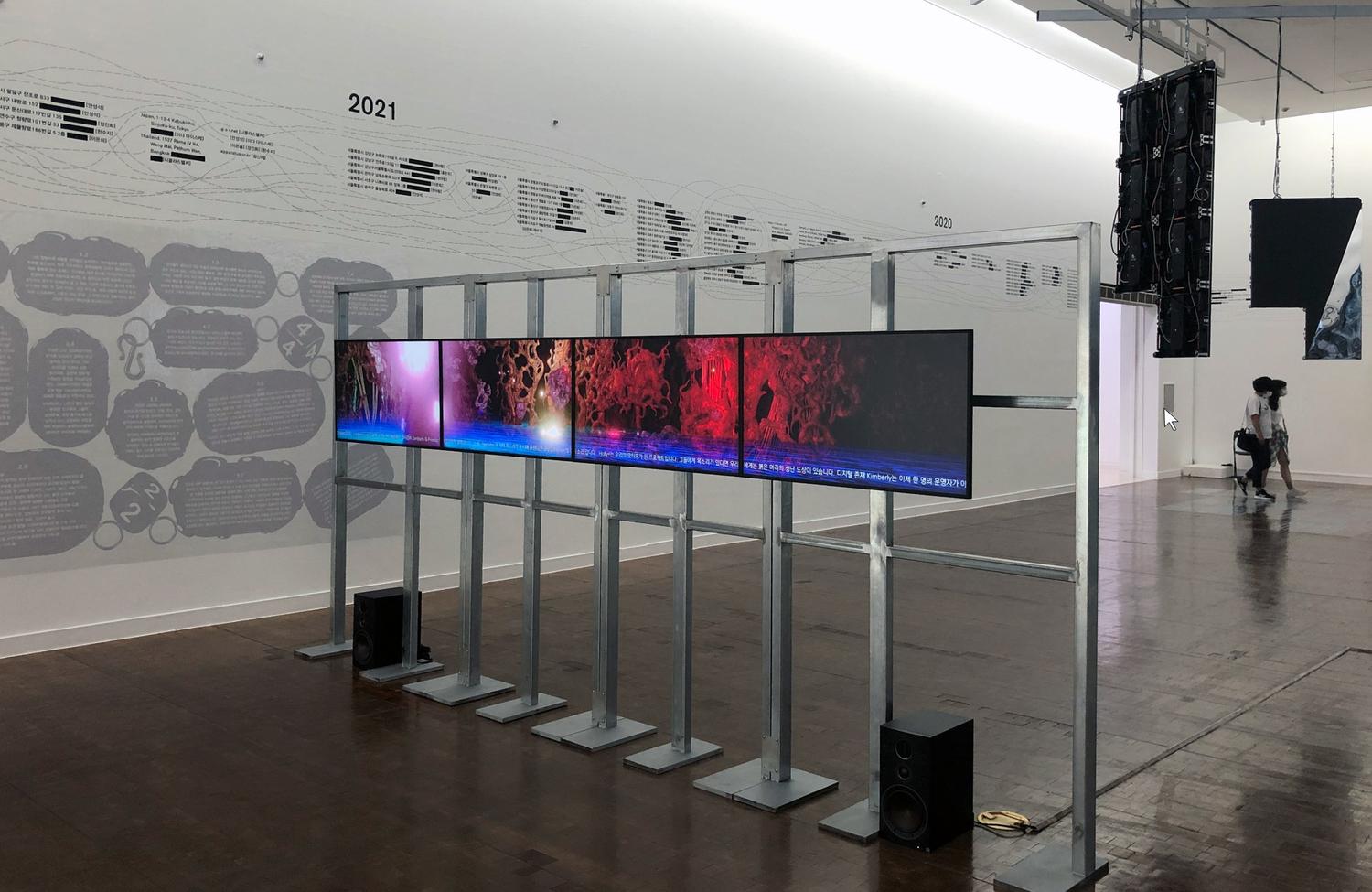 Eunsol Lee,
Kimberly & Friends, 2022, Installation view of 《Grid
Island》 (Seoul Museum of Art, 2022) ©Eunsol Lee
Eunsol Lee,
Kimberly & Friends, 2022, Installation view of 《Grid
Island》 (Seoul Museum of Art, 2022) ©Eunsol LeeFurthermore, in 2022, Eunsol Lee presented
a new work, Kimberly & Friends (2022), at the group
exhibition 《Grid Island》 held
at the Seoul Museum of Art. Kimberly, who had previously occupied the virtual
world as a single entity guided by one operator, began to engage with others
through this work.
To form Kimberly’s network, Eunsol Lee
assembled a team consisting of Pack.system, Seunghyun Lee, KIMSOOHIE, Jeong
Jinhwa, SOLLEE KIM, and Aggie Nam. Together, they created and operated a decentralized
network separate from central control, organizing a community in the form of a
Web 3.0 solidarity model known as a DAO (Decentralized Autonomous
Organization).
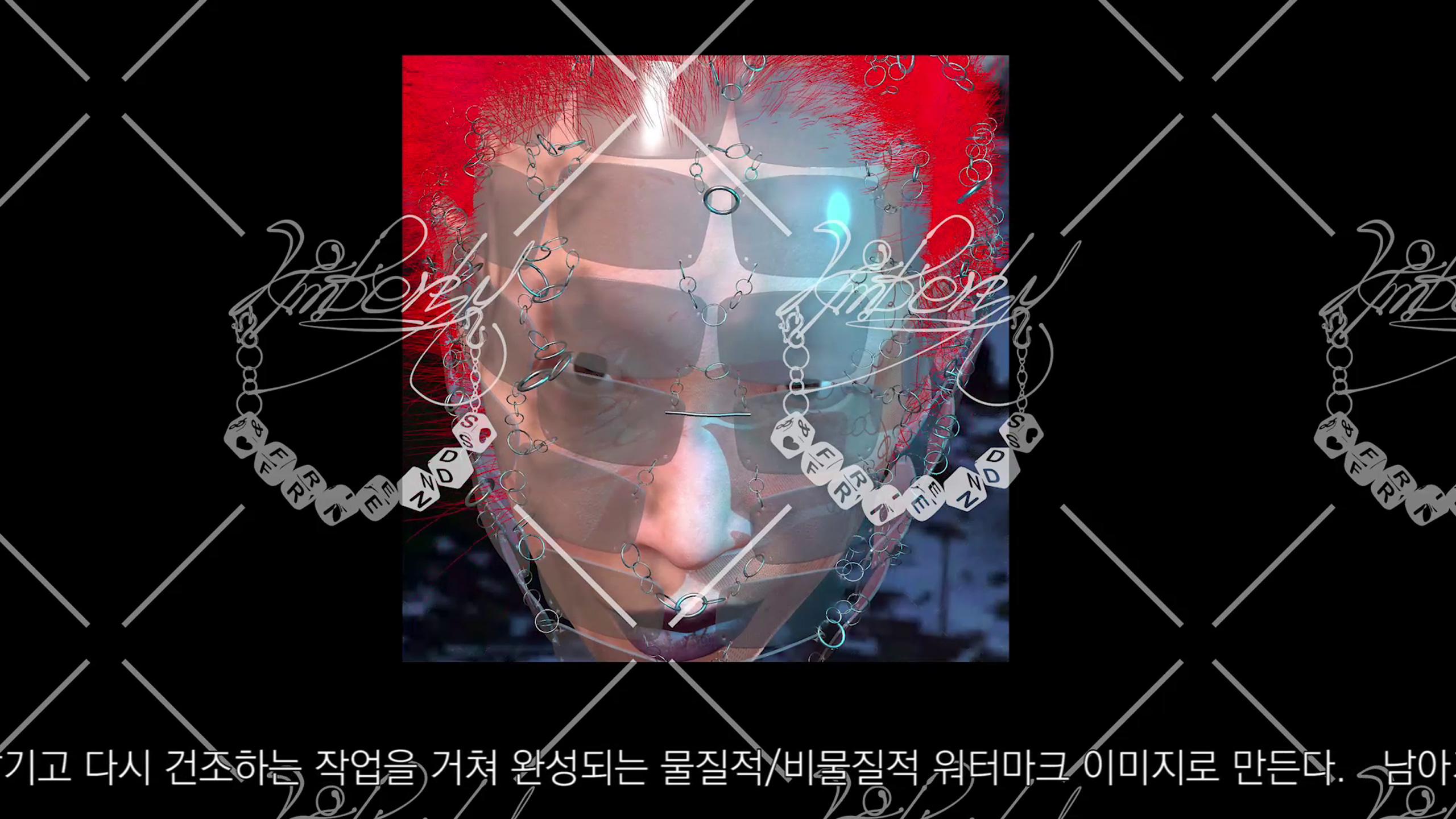 Eunsol Lee,
Kimberly & Friends, 2022, Single-channel video, sound,
clip from unity scene play, 9min. 40sec. ©Eunsol Lee
Eunsol Lee,
Kimberly & Friends, 2022, Single-channel video, sound,
clip from unity scene play, 9min. 40sec. ©Eunsol LeeThey sought to establish a foundation for
Kimberly’s survival and expansion by reflecting on contemporary art production
methods and transparent, sustainable asset management. Based on this, they set
common goals possible within a crypto-based community and established rules for
how to distribute shares in their collaborative relationships.
Kimberly & Friends
documents the process of the so-called “Kimberly DAO Co-Parenting Project.” The
team issued five NFTs and experienced a beta-form DAO, presenting the process
through promotional videos and a text wall. Each member contributed to
producing videos and texts in their own way, and these contributions are all
reflected in the resulting NFTs.
The decentralized network-based Kimberly
co-parenting community creates conditions where cryptocurrency can be
reasonably traded, moving away from the logic of traditional capitalism to
stabilize prices according to newly agreed-upon standards.
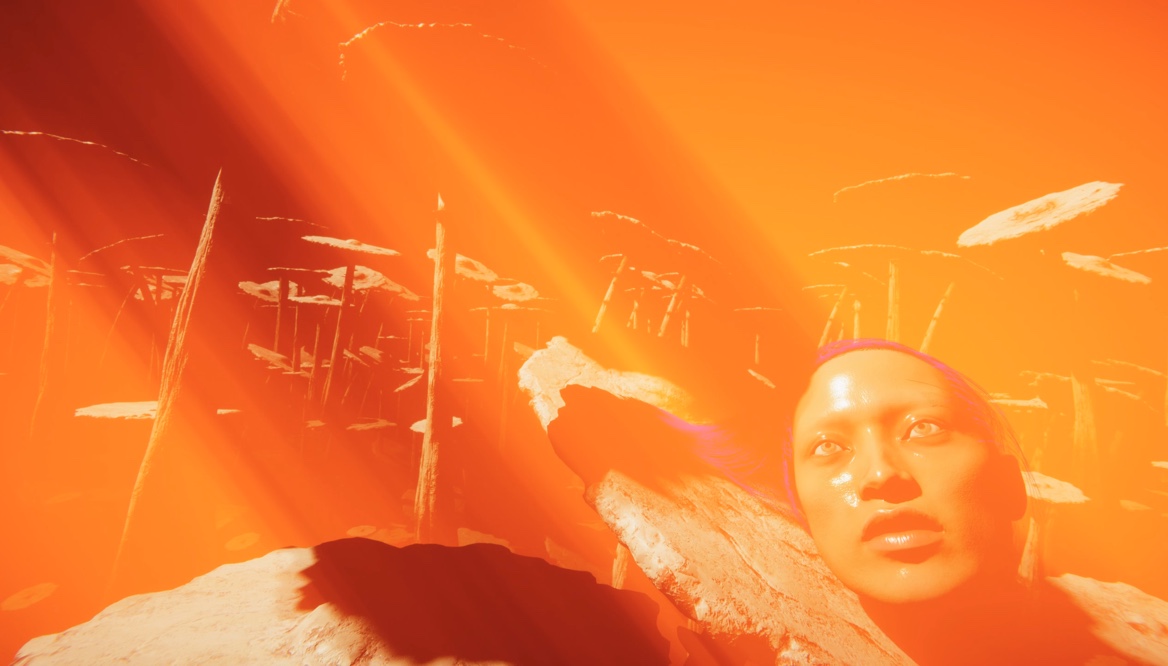 Eunsol Lee,
Midnight Sun Daze, 2023, 2-channel video, sound, color,
8min. 31sec. ©Eunsol Lee
Eunsol Lee,
Midnight Sun Daze, 2023, 2-channel video, sound, color,
8min. 31sec. ©Eunsol LeeEven though it is attempted within a virtual world, the logic of capital inevitably intervenes, which can give rise to a sense of optimism. However, Eunsol Lee builds upon art as anti-exchange value—valued precisely for its uselessness and futility. The video work Midnight Sun Daze (2023) encapsulates this strategy. The magical circles and occult elements appearing in the video serve as metaphors for art, while the figures depicted as demons or witches appear as allegories of Web 3.0’s anarchistic vision.
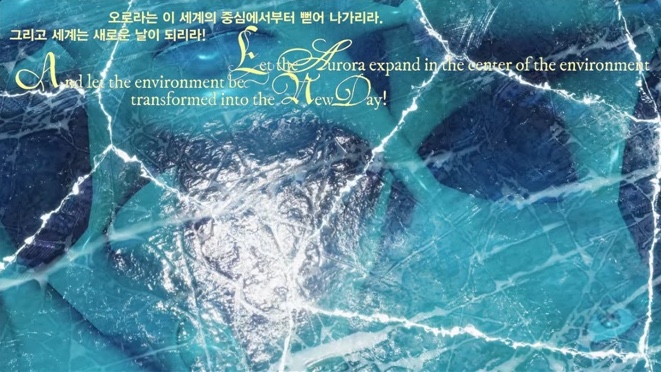 Eunsol Lee,
Midnight Sun Daze, 2023, 2-channel video, sound, color,
8min. 31sec. ©Eunsol Lee
Eunsol Lee,
Midnight Sun Daze, 2023, 2-channel video, sound, color,
8min. 31sec. ©Eunsol LeeThe midnight sun, which forms the
background of the video, metaphorically represents the continuously operating
online world, where Kimberly’s cephalopod friends set out in search of the
aurora. Embarking on an aurora journey during the summer with the midnight sun
implies that their quest is arduous and not guaranteed to succeed.
Nevertheless, Kimberly’s journey with her companions in search of the aurora
resonates with the journey of Eunsol Lee and her collaborators.
In this way, Eunsol Lee explores Kimberly’s
potential to transform into infinite forms and expand into infinite spaces
through collaboration with multidisciplinary, multi-media creators. Together,
they traverse various paths that disrupt the flows of creation and capital in
both online and offline worlds, as illuminated by Kimberly.
Beginning with skepticism toward the online
world, dominated by the infrastructure and capital logic of large platform
corporations, Lee’s work depicts the survival journey of digital objects with
anti-exchange value within the digital value system. This invites us to imagine
new ethics and modes of existence that fluidly traverse the boundaries between
technology and art, reality and virtuality.
”These days, when we talk about digital
ontology, we talk about networks. In the past, the idea was that the only truth
was the self that questions — the “I” existed because I was aware of myself.
But nowadays, identity is concretized through networks. Digital existence is
something that lies in the space between others and myself, a kind of point of
contrast. The “point” I’m talking about isn’t this point or that point — it’s
something floating somewhere in between, and by existing just like that, it becomes
a point of infinity.” (Eunsol Lee, from an interview with Space
413)
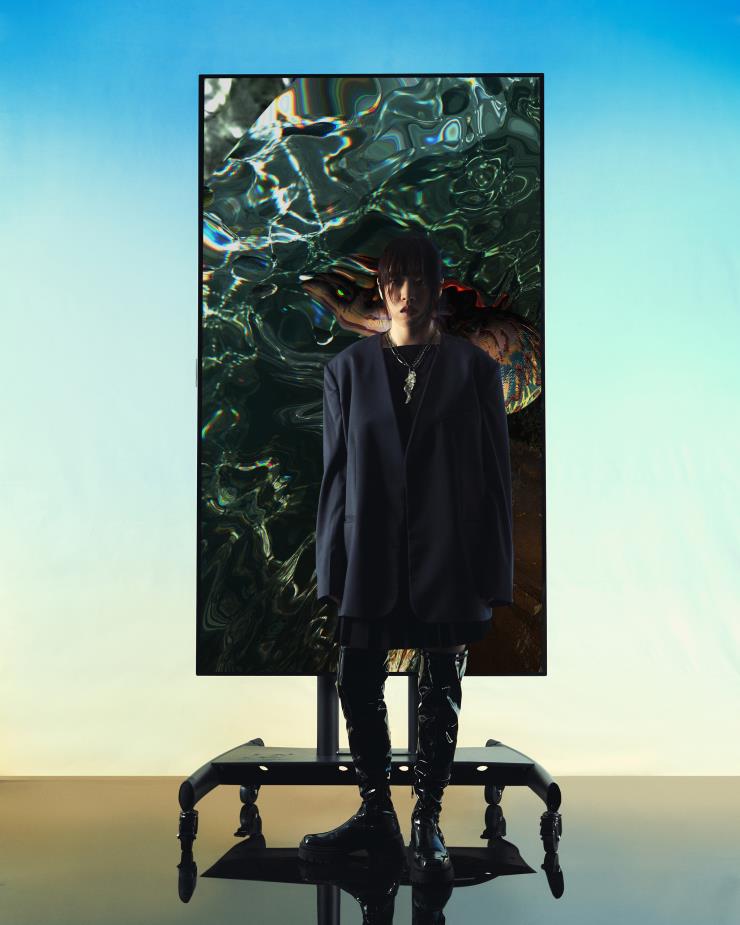
이은솔 작가 ©한국문화예술위원회
Eunsol Lee graduated from the Department of
Fine Art at the Korea National University of Arts and earned a master’s degree
in video art from the same university’s graduate school. Her solo exhibitions
include 《Kimberly the Optimist》
(Space 413, Seoul, 2021) and 《KIMBERLY EXTRACT》 (SeMA Storage, Seoul, 2021).
She has also participated in group
exhibitions such as the 《2023 ARKO Art Center x Digital
Art Festival Taipei Screening Program》 (ARKO Art
Center, Seoul, 2023), 《The Postmodern Child》 (Busan Museum of Contemporary Art, Busan, 2022–2023), 《Grid Island》 (Seoul Museum of Art, Seoul,
2022), 《The Taming of The Shrew》 (Museumhead, Seoul, 2022), 《TYPOJANCHI
2021: A TURTLE AND A CRANE》 (Culture Station Seoul 284,
Seoul, 2021), and 《Solicarity Spores》 (National Asia Culture Center, Gwangju, 2020).
Eunsol Lee was selected as an artist-in-residence
in various residency programs, including the Korea National University of Arts Residency
in 2024, Seoul Art Space Geumcheon in 2023, and SeMA Nanji Residency in 2022.
References
- 이은솔, Eunsol Lee (Artist Website)
- 김시우, 머리 없는 도상, 혹은 머리 그 자체에 관해
- 서울시립미술관, 이은솔 개인전 “KIMBERLY EXTRACT” (Seoul Museum of Art, Eunsol Lee Solo Exhibition “KIMBERLY EXTRACT”)
- 아트바바, 공간 사일삼 – 이은솔 개인전: Kimberly: 수렴으로 최적화 (Artbava, Space 413 – Eunsol Lee Solo Exhibition: Kimberly the Optimist)
- 서울시립미술관, 그리드 아일랜드 (Seoul Museum of Art, Grid Island)
- 허호정, 백야의 두족류, 오로라를 찾아서, 친구들과 합체


















